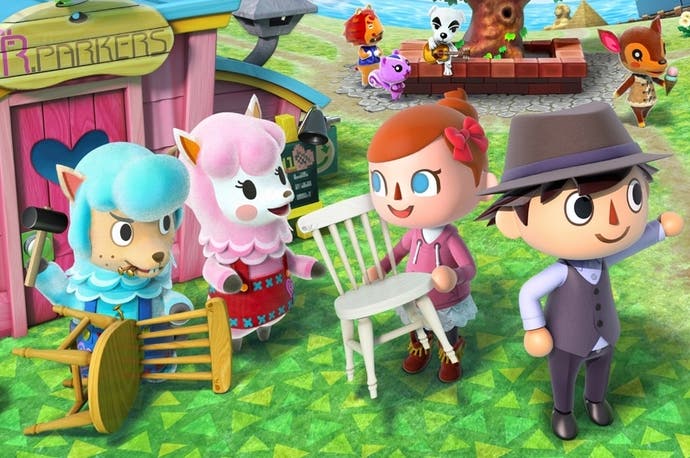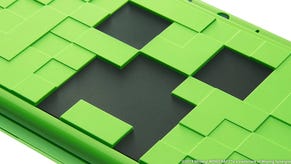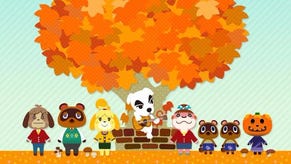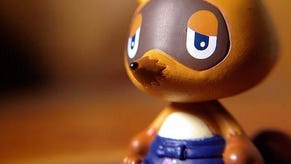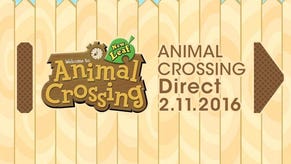Animal Crossing: New Leaf review
Thanks much.
It started in earnest a few weeks back. On a bright Saturday morning in mid May, I awoke to a list I had written the night before: Find washers, fix tap, buy apples, sell apples. An innocent enough agenda, but I knew. I knew those apples I was selling weren't the same apples I'd be buying at the local Co-op. I knew the madness had begun.
Another few days and I hit bottom. Come the 23rd I was seriously in the hole to a tanuki over some home improvements, I had an editorial meeting at four, and it clashed with a house visit from Leonardo, a gentle leopard with a thing for weightlifting. On top of that, I had an electrician coming round in the evening, and I was behind on payments for a bench I was building over by the pear orchard. Oh, and I'd sold all my furniture. And my carpets and wallpaper. And all my clothes.
Understanding how I reached this point - and how, I'm glad to report, I got back up again - may be as good a way as any to approach the peculiar charms of Animal Crossing: New Leaf. Nintendo's village simulator has always had a knack for tangling itself up with your workaday world as it keeps pace with you, hour by hour, minute by minute. As you move into your new town, sort a mortgage and make friends with whatever collection of bears, mice, frogs, and sheep you've been offered, there are distinct stages to Animal Crossing that any player of any one of the games will instantly recognise, in fact. Why isn't this my real life? Am I totally sure this isn't my real life? In which of my two lives am I meant to be waiting in for that electrician?
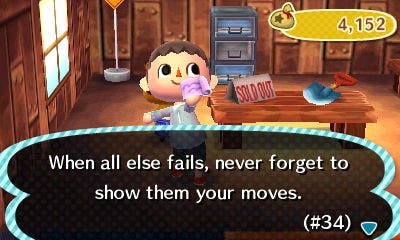
The 3DS version takes everything a bit further though, with a schedule that elongates the discovery process while simultaneously handing you more power to control where things are headed. Animal Crossing is by its nature a gentle kind of game, but for my first few weeks with the new instalment, I never played it in a gentle manner. I rinsed it for money. I hunted for exploits. I ground.
A lot of this was because New Leaf makes you the mayor of your village. This is a big change for the series, and it works better than you might expect. It's a shift that acknowledges the unlikely magic that has always leant Animal Crossing its distinct strain of melancholy - that you are an outsider, a human amongst animals, but also cut off in deeper ways, too. You're a mismatched fulcrum in a game of clockwork reciprocity, able to fetch items and initiate chit-chat, but doomed to never get much deeper in your relationships. Also, and less poetically, being the mayor also gives you lots of things to save up for - lots of reasons to rinse, exploit, grind - since the main duties of your office all cost big money.
Why isn't this my real life? Am I totally sure this isn't my real life? In which of my two lives am I meant to be waiting in for that electrician?
Your powers are twofold. Sat in the leather chair in your town hall, chatting to your assistant Isabelle (she's eager and awkward like a puppy, which is handy since she's also a puppy) you're able to issue ordinances, which affect the overall tone of your town, keeping the shops open late if you only get to play at night, say, or ensuring the items you find are a lot more expensive. You're also able to embark on public works projects, which means building all-new stuff. Ordinances require a hefty payment up-front, while buildings require a hefty payment to complete them. Either way: hefty payment.
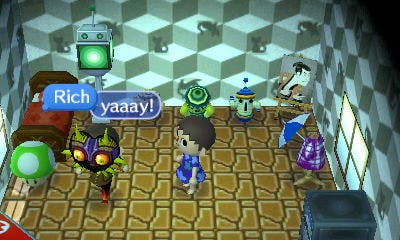
Tilting you heavily towards building stuff, meanwhile, is the fact that New Leaf kicks off with a relatively threadbare town. Upgrading shops and houses has always been part of the Animal Crossing agenda, but your first wander around this time can leave you a little disappointed. Where's KK Slider? Where's Brewster and his delicious Americanos?
The answer, of course, is that you have to improve your town so that people will want to move in and businesses will want to open. Benches, fancy clocks, fountains: all these things are yours to build once you find a spot and then start to raise funds. You choose your projects from a list selected by villagers: the more you construct, the more you spend, and the more incidental stuff you do as you play, the better the things you can then build next time turn out to be.
Grinding or otherwise, patience is mandatory: If you want a suspension bridge, for example, you're going to be able to achieve your dream pretty early on so long as you spend a lot of time netting expensive butterflies and shaking trees. If you want the coffee shop - with the additional right to work the odd shift behind its counter - well, that's going to take some effort. The coffee shop's the Animal Crossing equivalent of a boss fight.
Again, time and (in-game) money have long been the twin gods that hold Animal Crossing in their strange thrall, but you have to be extra careful with New Leaf, because it demands so very much. If you're not careful, this leads to the kind of things that don't always seem in keeping with the spirit of the whole enterprise: factory orchards filled with exotic fruit, a vibrant black market for dinosaur bones, fish, and butterflies. When I reached my low point on the 23rd, I had sold pretty much everything I had, save the photocopier I kept in my house because it seemed somehow rather mayoral. I never chatted to my animal friends, and I never donated stuff to the museum. New Leaf had revealed who I really was: selfish, cash-grabbing, desperate for some kind of order. I was Howard Hughes minus the stupid wooden aeroplane. Now it was time to be somebody different.
New Leaf had revealed who I really was: selfish, cash-grabbing, desperate for some kind of order. I was Howard Hughes minus the stupid wooden aeroplane.
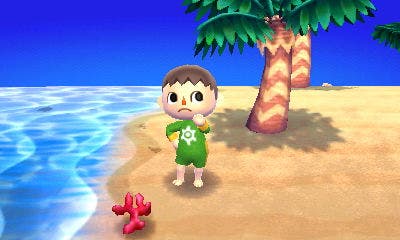
And that's when I started to really appreciate New Leaf and its clever pacing. You don't actually have to grind. You can simply take it slow and enjoy a game that has found a new way of measuring out its pleasures. There's an unprecedented focus on self-expression, certainly, but there's also a steadier stream of new treats leading off into the far future. You're a mayor so that you don't have to become a caretaker quite as quickly: there's a much longer period to enjoy before you reach the endgame point where the whole thing transforms into a pleasant half hour visit each day for a bit of weeding, bug-hunting and small talk. In this respect alone, New Leaf's easily the best Animal Crossing since the first. It's another testament to open-ended fun, another reminder that play does not have to be funnelled towards conditions like victory and defeat.
There are other tweaks, too. There's another of the series' tropical islands to explore and this time it's riddled with surprisingly decent mini-games to play alone or with friends. There's a new art style, bringing slightly more realistic proportions to the cast, which isn't as weird as it sounds, while covering the grass with a distinct velour texture that takes a bit of getting used to. There's the 3D.
Elsewhere, multiplayer and StreetPass combine to make this the most connected Animal Crossing yet. Besides local and wi-fi pal visits, you can share your house with strangers, glimpse randoms' villages via a Dream Suite, and even maintain a friends list for instant messaging. It's nice stuff, and the vital universe-in-a-bottle atmosphere is never threatened by these online intrusions, just as the warm familiarity is never damaged by old friends in new roles - Nook now focuses exclusively on real-estate (I still blame him for 2008) while his nephews run his shop, KK's found at a Main Street club - or fresh additions, like an ecologically-minded sloth who manages a garden centre, and a bunch of alpacas who own the recycling station.
As ever, the most involving changes are rarely the most significant, though. I love the bench on the edge of Main Street where you can sit and stare out across the ocean at night while stars arc overhead. I love the way you can trade Play Coins for fortune cookies which will give you Nintendo-themed items for your home. I love the fact you can stack fruit in your inventory and that, if you pick up a wetsuit, you can go for a swim.
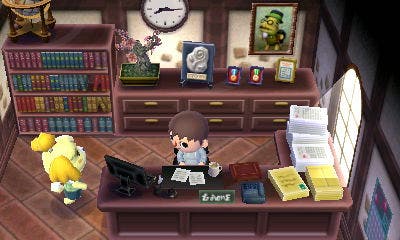
Fruit stacking! Over the years, Animal Crossing has become a more accommodating game. Alongside shovels that rarely break and the scandalous option to choose your town layout before you arrive for the first time, this trend could have potentially combined with your mayor powers to provide a gentle philosophical shove - towards offering a world tuned to your designs rather than a world that feels mysterious and distinct, which you must learn to fit in with.
Somehow, though, enough friction remains: you're still thrust into a landscape you can never entirely make your own, no matter how big your house, how perfect your Feng Shui, or how much you control the built environment. You're still surrounded by grumpy, charming, arrogant villagers (these come in two new flavours: hamster and deer) who are leftfield masterpieces of economical characterisation. In keeping with this friction business, incidentally, I suspect the genius of Animal Crossing's NPCs ultimately lies with their flakiness. They don't convince because they frequently ask to come over and check out your house, but because, when the appointed time ticks around, they often don't bother to show up.
This is my Animal Crossing, but it doesn't have to be yours. Maybe you time-travel or quit without saving when things don't go your way. Maybe you race about, ping-ponging between tasks and skipping Cap'n's songs. Maybe you hit the FAQs to streamline build queues and maximise fruit revenue while you track down the game's luckiest objects. There's as much depth as you're looking for, and for a game you can't win, there are a surprising range of different ways to play.
Why do I care what this leopard thinks of me? Why am I losing sleep over the construction of a virtual bench?
All have their dangers, however: dangers that are only heightened by the richness of New Leaf. Time-travellers risk ruining a game fiction that's so whimsical yet so steely that I still can't bring myself to explore the new option to complain about a villager, while all that racing around means you'll trample flowers and miss the lazy little moments that ultimately make the world feel real. The FAQ attack, on the other hand, exposes game systems that were never really meant to work as actual mechanics. Conditions for unlocking certain items are deeply buried, for example, and that's probably why the eventual arrival of the option to build a coffee shop doesn't actually feel like a mere unlock. Some triggers should retain their mystery.
Finally, playing it my way has lead me to the kind of self-reflection that a man in his 30s can't always afford. Why do I care what this leopard thinks of me? Why am I losing sleep over the construction of a virtual bench?
Maybe, though, you're somewhere else in this special game's vast audience - a clued-in senior who's long tired of Brain Training, or a delighted kid falling in love with video games right at the start of your personal journey. The first Animal Crossing you play is always the best, isn't it? If this is your first, I envy you.
